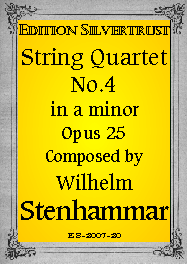Presents
Wilhelm Stenhammar
String Quartet No.4 in a minor, Op.25
 "One of the
mightiest quartets in the entire history of Swedish music," was how the scholar
and critic Bo Wallner styled this work. And Wilhelm Altmann, perhaps the
greatest chamber music critic of the 20th century, regarded it as the finest to
have come out of Scandinavia.
"One of the
mightiest quartets in the entire history of Swedish music," was how the scholar
and critic Bo Wallner styled this work. And Wilhelm Altmann, perhaps the
greatest chamber music critic of the 20th century, regarded it as the finest to
have come out of Scandinavia.
Indeed, those critics familiar with Stenhammar's six string quartets routinely rank them as the most important written between those of Brahms and Bartok. There is no denying that they represent a very important development during the twenty five years he was writing chamber music. Tonally, they range from the middle late Romantics to late Sibelius. Though not unknown by the Swedish chamber music public, his string quartets have been sadly neglected elsewhere.
Stenhammar (1871-1927) was trained as a pianist, became a virtuoso and was considered the finest Swedish pianist of his time. Concert pianists who venture into the realm of the string quartet often wind up writing compositions which sound like they were composed at, and are perhaps better played at, the piano. This is certainly a valid criticism of some of the quartet writing of both Schumann and Mendelssohn. That Stenhammar's works show no such trait is due entirely to the fact that for nearly half of his life, he worked intimately with the Aulin Quartet, the top Swedish string quartet of its day and one of the best then performing in Europe. In fact, he toured throughout Europe with them for many years and a piano quintet was nearly always featured on their programs. Thus it is no accident that his quartets show a fine grasp of instrumental timbre and technique. The part writing is sure and evenly distributed with the instruments never being asked to perform in a non-violinistic manner.
The Fourth Quartet was begun
in 1904 but only completed in 1907. It was dedicated to his friend, Jean
Sibelius. Here is a quartet which fuses Nordic
folksong with a Beethovian development technique but also incorporates the
lyricism of the late romantic movement. The opening Allegro ma non troppo
begins with a dramatic, downward spiraling passage which serves as the motif of
the highly chromatic music which follows. In the background we hear snippets of
an old folk ballad but are never really allowed to hear the whole. By contrast,
in the beautiful Adagio which follows, Stenhammar Presents
the
entire folk tune which is a plaint, a sad and somewhat pleading song. Next comes
an energetic and frenetic Scherzo with unusual alternating rhythmic hand-offs
between the voices. The superb finale, Aria variata, is exactly what the
title indicates. A set of variations on an opening song. The theme is taken from
the Swedish folksong, And the knight he spake with young Hillevi.
There are ten variations which follow and they are as good or better than any other
set ever written for string quartet. This is why Bo Wallner considered the
Fourth such a mighty work.
A masterpiece which professional quartets would do well to add to their repertoire. While not a particularly easy work to play, it is in no way beyond the reach of skilled amateurs and will more than repay the effort put into learning it.
Parts: $24.95